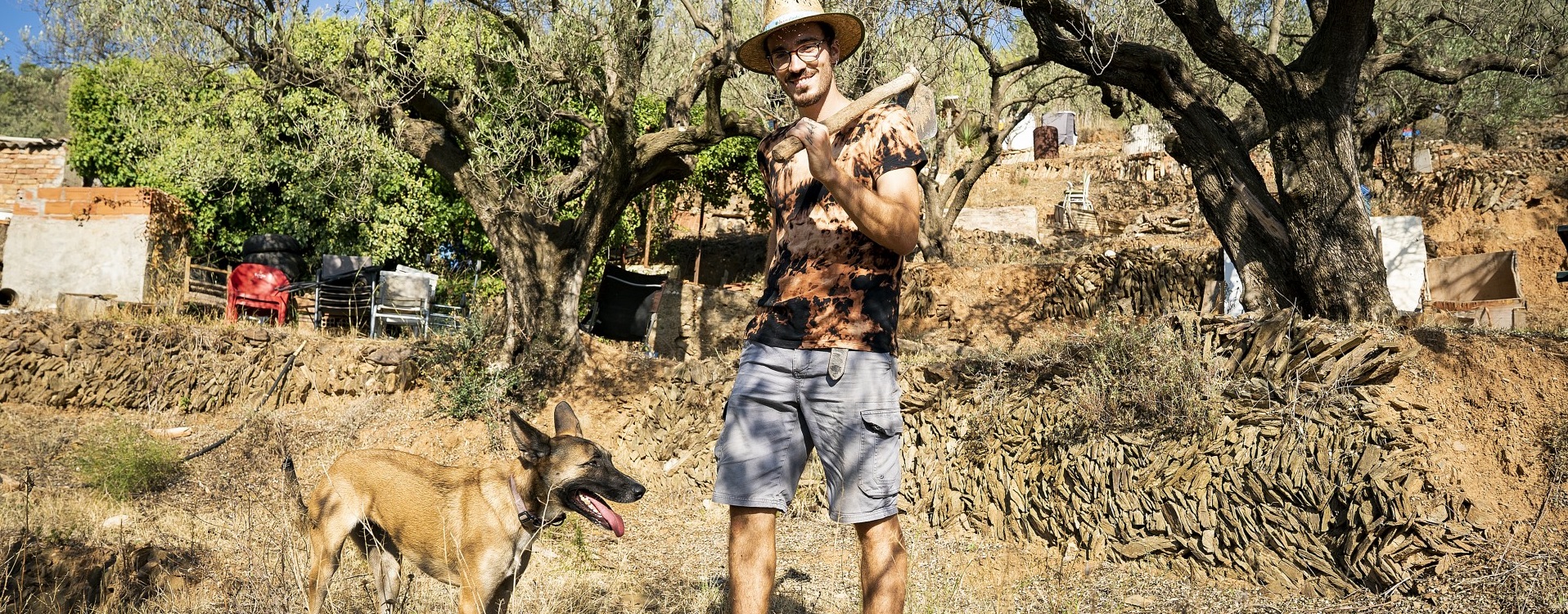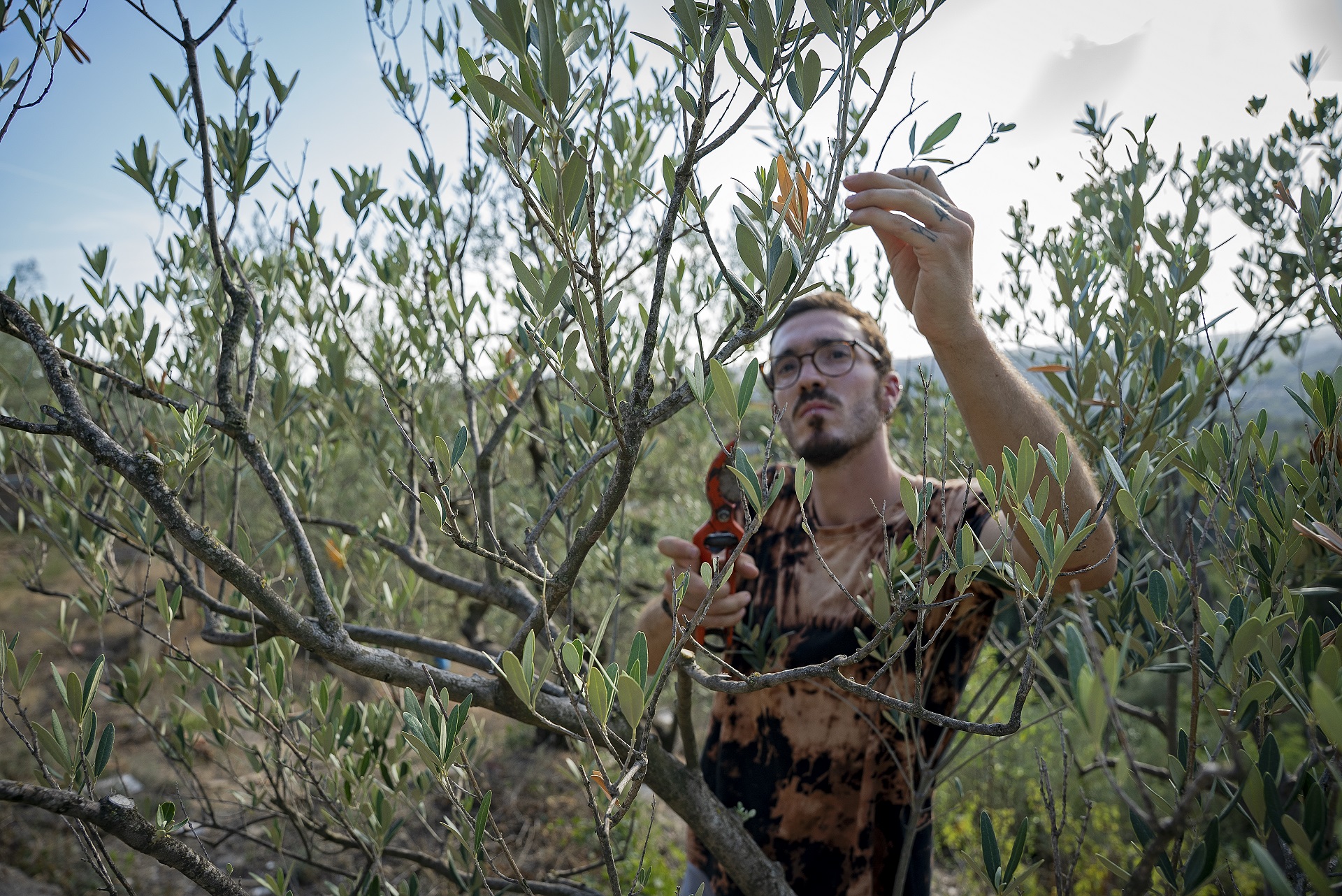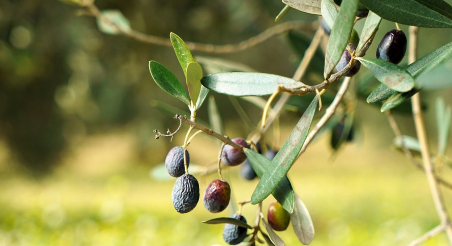Albert Maeso (Barcelona, 1994) graduated in Energy Engineering from the Universitat Politècnica de Catalunya and has recently signed a contract with a landowner in Olesa de Montserrat, allowing him to cultivate olive and fig trees for personal consumption. He signed this contract with the help of the advisory service provided by the Montserrat Rural Park Land Bank, which has facilitated his entry into an activity that has attracted him since childhood.
Maeso learned the farming trade from his maternal grandparents, who always lived off the land and ran a farm for many years. His passion, vocation, and knowledge come from his family. However, he didn’t inherit any land, so he is delighted that land banks exist—tools that connect people who own agricultural land they cannot work with those interested in cultivating it. He also appreciates that the services they offer go beyond just advice on drafting lease contracts, providing spaces for learning, support, and agricultural entrepreneurship. Albert Maeso is keen to continue his training and, in fact, regularly attends the microcourses organised by the Montserrat Rural Park Land Bank and it gives him access to a professional activity that has attracted him since childhood.
Firstly, congratulations on signing the lease for your first farm. Do you feel prepared to manage it? Do you have any training in agriculture?
I studied Energy Engineering at the UPC, but I’m currently working in the leisure sector with children and young people. As for agricultural training, I learned from my maternal grandparents, who always lived off the land. They were farmers for many years, and I spent a lot of time with them growing up. Today, they are the main reason I remain rooted in this region. I have also taught myself more sustainable and ecological farming techniques.
So, you come from a farming family.
Yes, I come from a family of farmers, and I will be forever grateful for that. My grandparents taught me about the harshness and beauty of rural life. Once you experience the satisfaction of eating what your own hands have grown, it’s hard to give up the desire to become a little more self-sufficient each day, provide good food for the people you love, and try to keep alive the ancestral knowledge that has been passed down through generations to achieve the best possible harvest.
«Once you experience the satisfaction of eating what your own hands have grown, it’s hard to give up the desire to become a little more self-sufficient each day» Albert Maeso
What jobs have you had until now?
I’ve worked in a variety of sectors. Currently, I’m a leisure activity leader, but I’ve also worked as a charity fundraiser, an aluminium carpenter’s assistant, and an agricultural labourer.
How long have you had land?
I don’t think we can talk about "having land" in the strictest sense. At the start of the summer of 2020, I reached a lease agreement with the owner of the land I currently work on. So, I have it on lease, but I’m obviously not the owner.
How did you acquire it?
I was determined to find land in the Montserrat area, so I spent a few months searching around Olesa and asking the locals if they knew the owners of any abandoned land that might interest me. Finally, after following various leads, I found a plot that turned out to belong to the grandfather of a girl from the village whom I had known for years. I contacted her, and they really liked the idea. They made everything very easy for me.
How large is the plot, and what do you grow?
It’s just under half a hectare, and I mainly grow olive trees, although I also have some almond trees and a couple of fig trees.
How did you discover the Montserrat Rural Park Land Bank? How has this tool helped you?
I found out about it by talking to people who had heard of it. Both the landowner and I were very interested in using this platform to formalise a legal contract. Additionally, the training capsules they offer have been very helpful, as they allow me to learn new agricultural techniques.
Have you recommended this service to other young people like you?
Absolutely! Whenever a young person tells me they’re looking for farmland, I always suggest that their first option should be the land bank, although there aren’t many plots listed compared to the number of abandoned fields you see.
What are your future plans?
I try not to plan too far ahead because, for now, I’m focused on surviving financially and carrying out this rewarding project. I’m convinced that I want my future career to be connected to the natural environment, but I’m not sure whether that will be as a farmer, a nature guide, or a forester. There are many options open to me, and life, luck, and my aspirations will ultimately determine my future.
What does being a farmer bring you?
I believe being a farmer is more of an attitude than a hobby or a job, although it’s certainly a lot of the latter as well. I want to be a farmer because I believe it’s one of the most dignified professions —also one of the worst paid, unfortunately. Aside from the pragmatic aspect of producing healthy food for yourself and your loved ones, I think being a farmer today is a form of subversion against the fast-paced lifestyle imposed by a capitalist system that makes us work harder and faster every day. It’s subversive because it forces us to see that nature follows its own rhythm, which isn’t a straight, uniform line, but one that follows certain cycles and has limits. You could say it pulls us out of the whirlwind and grounds us. In short, it brings me peace.
«Being a farmer brings me peace» Albert Maeso
Is it viable to survive with this land?
Not at all! This land produces enough oil for my family and the landowner, and in good years, we might be able to sell a few litres. But the steep terrain and market prices make it unprofitable. Those of us who continue to maintain the olive trees in these areas are romantics who enjoy keeping alive a popular tradition that, in some cases, has been passed down from parents to children. It’s also important to note that we help keep the rural world alive and well-maintained, which is crucial for preventing fires.
— BCN Smart Rural Editorial —
About the Montserrat Rural Park Land Bank
The Montserrat Rural Park Land Bank is one of the land banks that form part of BCN Smart Rural, the strategy of the Barcelona Provincial Council to transform the agri-food sector in the region. Its aim is to connect landowners with abandoned or unused plots with people seeking land to cultivate, providing technical and legal support tailored to the needs of both parties. To achieve this, it collaborates with local councils and organisations that wish to preserve the rural landscape and promote agricultural activity in the area.
The services offered by the land bank are free and include facilitating contact between both parties, providing technical assistance, legal advice, contract formalisation, ongoing training, and other actions that directly benefit landowners and tenants. This tool also has a very positive social and environmental impact, as it helps reduce the risk of wildfires, preserve the landscape, revitalise rural areas, and promote the consumption of local products to combat climate change.
For more information about the Montserrat Rural Park Land Bank, please contact Pere Navarro and Marta Martínez, territorial engineers for the BCN Smart Rural strategy.




